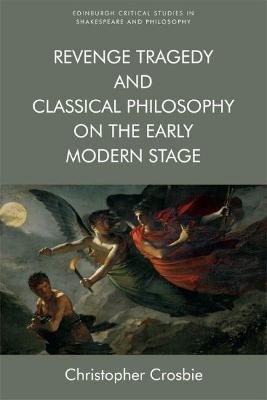
Revenge Tragedy and Classical Philosophy on the Early Modern Stage
Seiten
2018
Edinburgh University Press (Verlag)
978-1-4744-4026-4 (ISBN)
Edinburgh University Press (Verlag)
978-1-4744-4026-4 (ISBN)
Examines the influence of classical philosophy on revenge narratives by Shakespeare and his contemporaries
This book discovers within early modern revenge tragedy the surprising shaping presence of a wide array of classical philosophies not commonly affiliated with the genre. By recovering the pervasive influence of Aristotelian faculty psychology on The Spanish Tragedy, Aristotelian ethics on Titus Andronicus, Lucretian atomism on Hamlet, Galenic pneumatics on Antonio's Revenge and Epictetian Stoicism on The Duchess of Malfi, Crosbie reveals how the very atmospheres and ontological assumptions of revenge tragedy exert their own kind of conditioning dramaturgical force. The book also revitalises our understanding of how the Renaissance stage, even at its most lurid, functions as a unique space for the era's practical, vernacular engagement with received philosophy.
Key Features
Analyzes the twentieth-century development of revenge tragedy as a genre, and diagnoses the roots of modern criticism's tendency to treat most philosophy as estranged from the violent work of revengeProvides fresh readings of five plays central to the revenge tragedy genre, paying close attention to the conditioning influence of classical philosophy on their narratives of retributionReveals how revenge tragedy's distinctive 'moods' or 'atmospheres' emerge from fully-realized sets of ontological assumptions which help shape reception of retribution on the early modern stageDevelops new reception histories for five classical philosophical doctrines, revealing their currency and, what's more, radical adaptability within early modern England
This book discovers within early modern revenge tragedy the surprising shaping presence of a wide array of classical philosophies not commonly affiliated with the genre. By recovering the pervasive influence of Aristotelian faculty psychology on The Spanish Tragedy, Aristotelian ethics on Titus Andronicus, Lucretian atomism on Hamlet, Galenic pneumatics on Antonio's Revenge and Epictetian Stoicism on The Duchess of Malfi, Crosbie reveals how the very atmospheres and ontological assumptions of revenge tragedy exert their own kind of conditioning dramaturgical force. The book also revitalises our understanding of how the Renaissance stage, even at its most lurid, functions as a unique space for the era's practical, vernacular engagement with received philosophy.
Key Features
Analyzes the twentieth-century development of revenge tragedy as a genre, and diagnoses the roots of modern criticism's tendency to treat most philosophy as estranged from the violent work of revengeProvides fresh readings of five plays central to the revenge tragedy genre, paying close attention to the conditioning influence of classical philosophy on their narratives of retributionReveals how revenge tragedy's distinctive 'moods' or 'atmospheres' emerge from fully-realized sets of ontological assumptions which help shape reception of retribution on the early modern stageDevelops new reception histories for five classical philosophical doctrines, revealing their currency and, what's more, radical adaptability within early modern England
Christopher Crosbie is Associate Professor of English at North Carolina State University where he teaches Shakespearean drama. His research examines the influence of classical philosophy on Renaissance literature, paying particular attention to the capacity of early modern theater to appropriate received intellectual traditions in innovative ways.
| Erscheinungsdatum | 11.01.2019 |
|---|---|
| Reihe/Serie | Edinburgh Critical Studies in Shakespeare and Philosophy |
| Verlagsort | Edinburgh |
| Sprache | englisch |
| Maße | 156 x 234 mm |
| Themenwelt | Kunst / Musik / Theater ► Theater / Ballett |
| Geisteswissenschaften ► Sprach- / Literaturwissenschaft ► Anglistik / Amerikanistik | |
| Geisteswissenschaften ► Sprach- / Literaturwissenschaft ► Literaturwissenschaft | |
| ISBN-10 | 1-4744-4026-6 / 1474440266 |
| ISBN-13 | 978-1-4744-4026-4 / 9781474440264 |
| Zustand | Neuware |
| Haben Sie eine Frage zum Produkt? |
Mehr entdecken
aus dem Bereich
aus dem Bereich
Poetik eines sozialen Urteils
Buch | Hardcover (2023)
De Gruyter (Verlag)
59,95 €
Buch | Softcover (2024)
belleville (Verlag)
20,00 €


